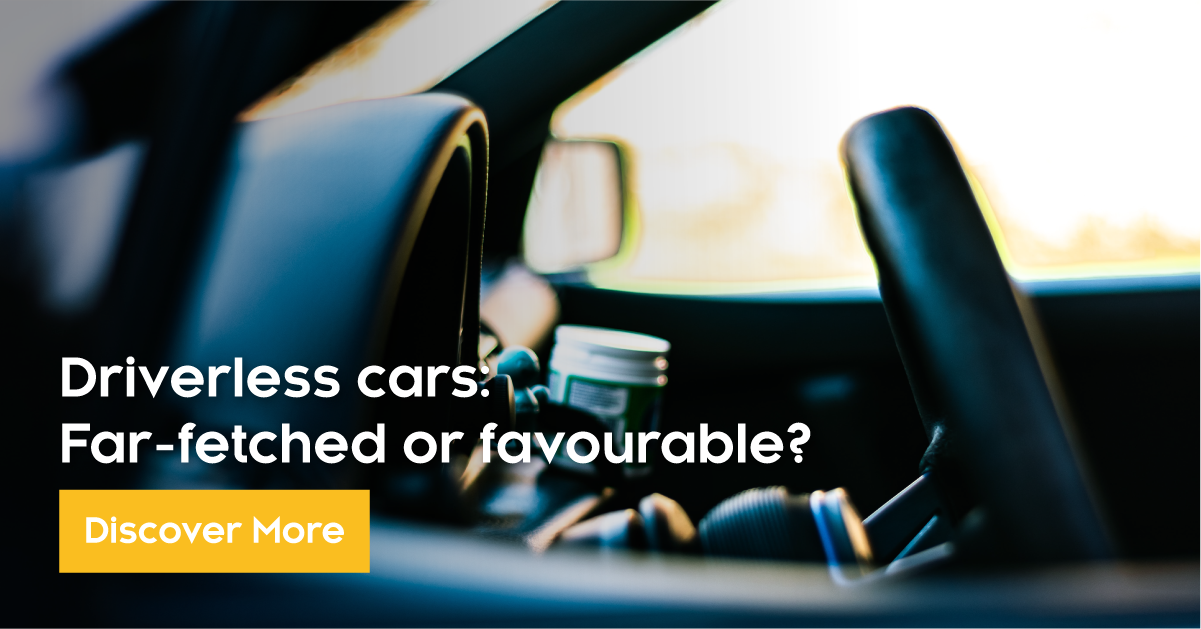Published on the 1st September 2020
Advantages of Driverless Cars: Far Fetched or Favourable?
Reading Time: 4 min read

Driverless cars, also known as Autonomous cars, are vehicles that are capable of operation without human involvement. This occurs when cars sense the environment around them. Driverless cars may operate entirely without the presence of human passengers in them. In fact, passengers travelling in an autonomous car aren’t required to take control of the vehicle and manoeuvre it in any way.
The advantages of driverless cars is that they have the capability to go anywhere traditional cars go, all while doing everything human drivers do. Having said this, there are numerous types of driverless cars that are currently in the engineering process that have different degrees of automation. While some can fully operate without the control of humans, others are able to perform driving tasks but require the interference of humans.
How Do They Work?
To put it simply, Driverless cars rely on the hardware to collect the data and the software to organise, compile and put it into action. These cars rely on sensors, actuators, complex algorithms, machine learning systems, and powerful processors to execute software.
Autonomous cars create and maintain a sort of perception or formula of their surroundings via the use of a variety of sensors situated in different parts of the vehicle. Radar sensors monitor the position of nearby vehicles and street objects that may be in the way. The cars’ video cameras detect traffic lights, read road signs, track other vehicles, and look for nearby people on the street. Light detection and ranging sensors bounce pulses of light off the car’s surroundings to measure distances, detect road edges, and identify lane markings. What’s more, the ultrasonic sensors in the wheels detect curbs and other cars when parking.
For the software part, all of this input data is normally processed through machine learning algorithms and complex codes that have been tried and tested in scenarios in the real world. In actual fact, the centre of this progressive creation is machine learning technology. Sophisticated software then processes all this sensory input, plots a path, and sends instructions to the car’s actuators, which control acceleration, braking, and steering. Hard-coded rules, obstacle avoidance algorithms, predictive modelling, and object recognition help the software follow traffic rules and navigate obstacles.
The more these vehicles are tested by sensing more data outside through autonomous algorithms, the better these vehicles get. Indeed, machine learning technologies can essentially teach themselves things like how to function – bringing them closer than ever to make our way of life that easier.
Which Companies are Producing?
As it stands, many car companies are working on developing driverless cars, for a chance to drastically change the transportation of the future. While some companies have yet to put their plans into practice and take their creations out on the road, others have tested it out and have more practical experience.
Currently, these are some of the best companies that have been producing self-driving cars:
- Tesla
- Waymo
- GM Cruise
- Argo Al
- Baidu
- Apple
- BMW
- Volkswagen
Advantages of Driverless Cars
There are many reasons that explain the advantages of driverless cars. For starters, driverless cars make life easier for people with special needs as well as the elderly, who may find regular driving to be somewhat difficult at times. They save time and maximise convenience. Forgot to have a look at a briefing before a presentation? You can do it in your car, hassle-free.
Apart from that, driverless cars can even be beneficial to the environment. The exact outcomes are tricky to foresee, given that the full advantages need to be tested in a situation where all cars on the road become driverless.
However, in a world where the full potential of driverless cars is unleashed everywhere, in a few decades, these new do’s of transportation could reduce traffic and the congestion that comes with it, cut transportation costs, improve walkability and livability, free up parking areas for other uses as well as reducing carbon dioxide emissions by 80% worldwide.
Insure Your Car
The far future of the transformation of cars is uncertain – Will the world get to a stage of switching to fully automated cars? If so, how long will this take? While the far future of cars is unknown, one can agree that in a similar way, so is the near future of your current care. Having your own back in an unforeseeable and uncomfortable situation is important. Insure your car today with GasanMamo Insurance Ltd. for a secure and inclusive insurance experience. If you’d like to set up or renew your motor insurance, have a look at our car and motor insurance packages to get a full insight into what we offer.
GasanMamo Insurance Ltd. is authorised under the Insurance Business Act and regulated by the MFSA